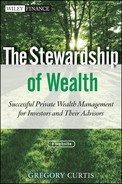Conclusion: Should Anyone but Yale Invest in Hedge Funds?
We got them steadily depressin', low-down mind messin', workin' at the hedge fund blues.
—With apologies to the late Jim Croce
David Swensen, as almost everyone knows, is the extraordinarily successful manager of the Yale University endowment. In Swensen's first book, Pioneering Portfolio Management,24 published in 2000 and addressed to institutional investors, hedge funds were portrayed as playing an essential role in reducing portfolio risk and in gaining access to the most talented managers. So it's no surprise that Yale has a big exposure to hedge funds.25
But in Swensen's second book hedge funds seemed to have disappeared from the face of the earth. In Unconventional Success,26 addressed this time to the individual investor, Swensen mentions hedge funds only in passing, mainly complaining about their fees. What gives?
Obviously enough, the first decade of the twenty-first century has been a rough one for the hedge fund industry. Returns have been disappointing, at least compared to what investors were expecting (and compared to what many hedge fund managers were projecting). The Securities and Exchange Commission (SEC) has decided to get tough on hedge funds, forcing them to choose between registering with the SEC or imposing long lockups on their investors. A steady stream of frauds and blowups have occurred in the industry—Bernard Madoff being Exhibit A—giving everyone a black eye.
I yield to no one in my skepticism of many of the players in the hedge fund business, and earlier in this chapter, I've not been shy about expressing my reservations. But let's try to strike a middle ground, because wealthy families are neither the institutional investors Swensen addressed in his first book nor the retail investors he addressed in his second. It's important to be aware of the challenges and disadvantages of investing in hedge funds, but it's also important to keep the advantages firmly in mind.
When people like David Swensen criticize hedge fund investing these days, it's worth taking the man seriously. After all, investors might ask themselves, if David Swensen says to avoid hedge funds, why am I so smart?
It's a good question. In fact, I agree with much of what Swensen has to say about hedge funds and funds of funds. In an interview in the New York Times, following the publication of his second book, Swensen was quoted as saying, “Funds of hedge funds generally aren't a good investment for the unsophisticated investor.”27 Hard to quibble with that. It isn't even controversial. After all, we know from a Dalbar paper28 that between 1983 and the end of 2000—the best U.S. bull market of all time—while the S&P 500 was returning an average of 16.3 percent per year, the typical equity investor achieved only 5.3 percent. And just to rub it in, while long-term bonds rose 11.8 percent, bond investors got only 6.1 percent.
We can hardly expect investors who can't manage stock and bond portfolios to be great hedge fund investors. And because most hedge funds of funds don't even begin to earn their extra layer of fees, suggesting to unsophisticated investors that they invest in funds of hedge funds is almost certainly doing them a disservice.
The key point here is that Swensen's advice about hedge funds—and my advice about hedge funds—differs depending on the nature of the investor. Here, in a (largish) nutshell, is how I would put it.
There is no gainsaying the fact that the hedge fund community has had a difficult time since the turn of the century, and that it has become a target for criticism by the knowledgeable and the clueless alike. Nor can I quibble with the claim that hedge fund investment activities are often (though hardly always) complex, opaque, and secretive. But the bottom line is the same as it usually is: Investors who are poorly or corruptly advised are likely to come to grief, and the more complex the investment sector the more grief they are likely to come to. Investors who are well advised, however, fall into a completely separate category and should stop worrying.
